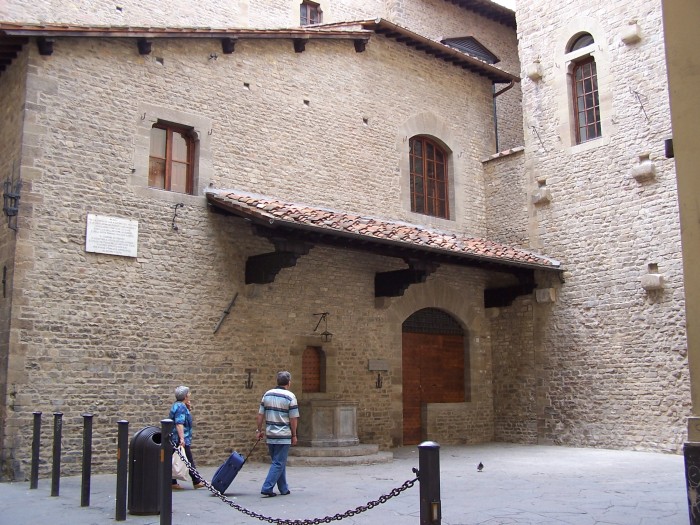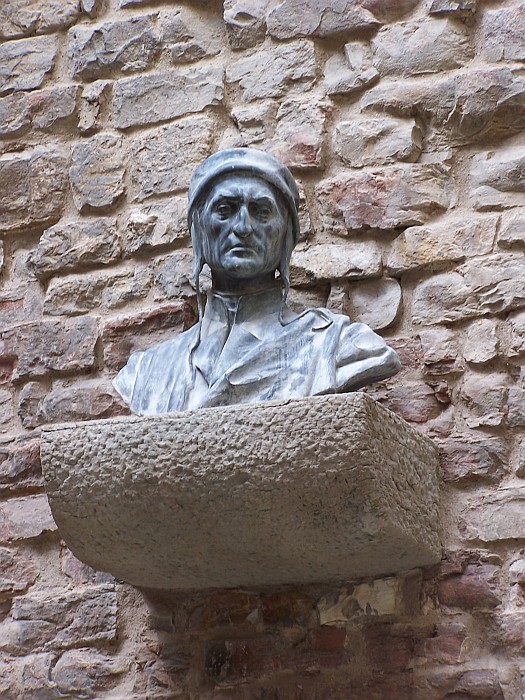(Italian pronunciation: kah-za dee dahn-tay)


Dante's house, the Casa di Dante, still stands near his parish church. It is uncertain whether the poet Dante Alighiere (1265-1321) was actually born here, but at least the house looks the part. In 1911, the remains of a 13th-century tower house were restored to give the building its rambling appearance.
Just a short stroll north of the house is the church of Santa Margherita de Cerch, built during the 11th century. It is here that Dante is said to have first caught sight of Beatrice Portinari, whom he idolized in his poetry. The church, which is often used for Baroque chamber music and organ recitals, contains a fine altarpiece by Neri di Bicci (1418-1491).

References to Dante in the movie Hannibal
from Dante
Alighieri on the Web
The main character, played by Anthony Hopkins, lives in Florence in disguise, pretending to be an American scholar specialized in studies about medieval Italian literature and especially Dante Alighieri.
The main reference to Dante’s work in the movie is the scene depicting Hannibal, Pazzi and his wife watching an opera. The opera is based, according to what the characters say, on the Vita Nuova. Specifically, the piece we hear in the movie is titled Vide Cor Meum and is based on the sonnet A ciascun’alma presa, in chapter 3 of the Vita Nuova. The music for the film is by Patrick Cassidy [fabricated for the film], produced by Patrick Cassidy and Hans Zimmer; the singers are Danielle de Niese and Bruno Lazzaretti who play respectively Dante and Beatrice and are also on the stage in this particular scene of the movie.
The sonnet in the Vita Nuova is referenced to in the movie with the name Vide Cor Meum since this refers to the Latin words in the prose introduction to the sonnet, which is also part of the Vita Nuova. In this introduction, Dante sets the time to be nine years after his first encounter with Beatrice. She appears to him again, dressed in white and with two other females and greets Dante with all her virtue. Enchanted by her sweetness and gentleness, Dante falls asleep and has a dream. In the dream he sees a mighty figure which says "Ego dominus tuus" (I’m your Lord). Beatrice is instead asleep in this figure’s arms. She brings in her arms what is recognizable as a heart and murmurs the words "Vide cor tuum" (Here’s your heart, where "Vide cor meum" means here’s my heart) while eating part of the heart. The two figures leave and Dante wakes up. He wants to tell what he has seen in the dream and writes the sonnet A ciasun’alma presa, the one read by Anthony Hopkins to Pazzi’s wife.
Here’s the text:
Here’s a free prose translation:
I write this piece of poetry for any soul taken by love and any
noble heart, so that they may write me back their opinion about it. I greets
our lord, that is Love. Love itself appeared suddenly to me when one third
of the night had already passed. If I think back about it I’m frightened.
Love seemed cheerful while bringing in its arms a sleeping woman wrapped
in a cloth and in its hands my heart. Love then woke her up and she ate
this burning heart; it then went away crying.
x x x
Another reference to Dante’s work is when Hopkins speaks about visual representations of the episode of Pier della Vigna in the Commedia.
He’s the main character of the 13th Canto of the Inferno, where Dante describes the circle where are punished the ones who committed suicide or who squandered all their money. Pier della Vigna was one of the advisers of the king of Sicily Federico II; the other envious courtiers accused him of betrayal of the king. Even if he was innocent, he committed suicide because of the shame. Besides being a political man, Piero was also a poet and scholarly. Some of the lines quoted by Anthony Hopkins are the ones where Pier delle Vigne answers Dante about the punishment to which the suicides are sentenced to:
Quando si parte l’anima feroce
dal corpo ond’ella stessa s’è disvelta,
Minòs la manda a la settima foce.
Cade in la selva, e non l’è parte scelta;
ma là dove fortuna la balestra,
quivi germoglia come gran di spelta.
Surge in vermena e in pianta silvestra:
l’Arpie, pascendo poi de le sue foglie,
fanno dolore, e al dolor fenestra.
Come l’altre verrem per nostre spoglie,
ma non però ch’alcuna sen rivesta,
ché non è giusto aver ciò ch’om si toglie.
Qui le trascineremo, e per la mesta
selva saranno i nostri corpi appesi,
ciascuno al prun de l’ombra sua molesta
[Inferno, Canto 13, vv. 94-108]
Here’s a free prose translation:
As soon as the soul violently separates from the body of the
suicide himself or herself, Minos sends it to the seventh circle of the
Hell. The soul falls on the ground of this wood, where it lands by chance.
There it germinates and grows easily. It then becomes a wild bush: the
Harpies eat it, causing pain to the soul; its groans can be heard through
the wounds on the eaten leaves. The Day of the Judgement we’re going to
take our bodies back just like any other human soul; nevertheless we’re
not going back into them because it’s not fair that
man has back what he or she has voluntarily teared apart. Then,
we’ll bring the bodies here and we’ll hang them up these trees born from
our hostile souls.
x x x
A last, en passant reference to Dante’s background made in the movie is when the errand of scholars reunites to discuss about the opportunity of giving the position of librarian to Anthony Hopkins. One of them names Guido Cavalcanti. He was one of Dante’s friends and also one of the most important poets of the Stilnovo movement. He was also directly named by Dante in some of his works.